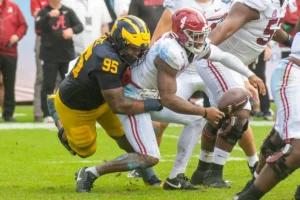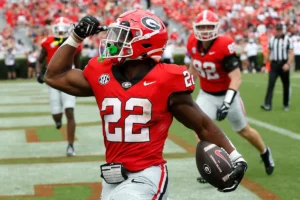
After Connor McDavid reaches 100 and the Edmonton Oilers reach 101, the game is over.
In the beginning, there was ice. Endless white stretching across a dark arena, lit by quiet halogen and restless dreams. And there was a puck, black as a secret, waiting in silence. Then came the sound—metal scraping, boards humming, the heartbeat of the game beginning to quicken.
Somewhere in the echo, skates carved their truths into the surface, and history began again.
But this wasn’t just another game. This was the game. Not because of its playoff implications, not because of TV ratings or an overtime thriller on a Tuesday night. This game—this night—had something eternal attached to it. Something whispered in locker rooms and felt in the marrow of every Oilers fan who’d grown up watching The Great One glide like light across the ice.
Because on this night, Connor McDavid reached 100, and the Edmonton Oilers reached 101, and in that simple symmetry—three digits for one man, three for the team—the game reached something like a conclusion.
Let’s rewind.
Back in the early months of the season, things were uncertain. The Oilers stumbled out of the gate. McDavid looked human. There were calls for changes, mutterings in the press, the same old stories about wasted potential, a cursed franchise, a generational talent skating uphill against mediocrity.
But then something shifted.
A quiet conversation behind closed doors. A player’s only meeting. Maybe it was McDavid himself, eyes focused like he could see through the walls, saying only, “We go now.”
What followed was a stretch of hockey so brilliant it shimmered like heat over ice. The puck obeyed McDavid’s will like it was born to. His edgework was a symphony. His vision? The stuff of prophecy. He didn’t just dominate; he orchestrated. And the team—finally, gloriously—followed.
Leon Draisaitl played like a man with something to prove. Zach Hyman, gritty and graceful, never stopped moving. The defense, often their Achilles heel, became suddenly reliable—led by a resurgent Darnell Nurse. Stuart Skinner stood tall in net, bearing the weight of the city’s hope on padded shoulders.
Win after win piled up like chapters in a legend. But everyone circled one night on the calendar. Because the math was undeniable. If McDavid kept his pace, he would notch his 100th point in Game 81. And if the Oilers kept theirs, they would hit 101 standings points that same night.
And so here we are. April. The air outside Rogers Place crisp, full of chatter. Inside, 18,500 strong chant his name before the puck even drops.
Mc-Da-vid. Mc-Da-vid.
The banners overhead don’t move, but somehow feel like they’re watching. Gretzky’s 99 stares silently from the rafters. Messier. Coffey. Kurri. They all know. They’ve all been here before—in this place where magic touches the mundane, and the game becomes something more than sport.
First period. He’s electric. A no-look pass to Draisaitl that carves through three defenders. A penalty kill shift where he steals the puck, turns on a dime, and nearly scores shorthanded. The arena is buzzing, building, holding its breath every time he touches the puck.
He notches his 99th point with an assist—an effortless little dish on the powerplay to Bouchard, who hammers it home from the point. The crowd erupts. They know what’s coming. They can feel it.
Second period. The Oilers lead 3–1. McDavid has taken over the game, even when he’s not on the scoresheet. He draws a double team on nearly every rush. He opens up space like a sculptor revealing form from marble. You can see the defenders hesitate, stutter, recalibrate—because they know if they guess wrong, he’s already gone.
Midway through the period, it happens.
A turnover at the blue line. McDavid picks it up with speed. One man back. Then none. A flick of his wrists, two crossovers, and he’s alone with the goalie.
He doesn’t deke. He waits.
Waits like time itself is listening. Then wrists it low blocker, clean and clinical.
Goal.
Point 100.
The bench empties as if it’s a playoff game. Players hug him. Coaches beam. Fans lose their minds. Someone throws a McDavid jersey onto the ice—worn thin from a decade of belief.
But McDavid doesn’t celebrate like it’s the finish line. He just nods. His expression unreadable. Focused. Because the game isn’t over.
Not yet.
There’s a strange kind of calm after that. The way snow falls after a storm. The Oilers score again—Hyman this time—and the arena begins to hum with realization.
The scoreboard now reads:
EDMONTON: 5 (101 Points in the Standings)
OPPONENT: 2
It’s over.
Not the game on the clock—that still has ten minutes left. But something else is over. Something bigger.
You can feel it in the arena, like a held breath finally released.
Because this night wasn’t just about two numbers.
It was about what those numbers represented.
A century of brilliance for McDavid—measured not in goals or assists, but moments that stole time.
And 101 points for the team—a mark of unity, proof that this wasn’t just McDavid dragging a carcass uphill. It was a team now. A real one. Maybe even a champion.
Later, they’ll talk about it as the turning point. The moment where something finally clicked for the franchise. They’ll call it a spiritual sequel to 1984. The night the Oilers didn’t just win—they arrived.
And McDavid? He won’t say much. He never does. Maybe something quiet, like:
“I’m proud of the group. We’ve got more to do.”
But if you looked closely during that final shift—when the puck was cleared, the horn sounded, and the team came together at center ice—you would have seen it.
The smile. The relief.
The moment he allowed himself to feel it.
Because after Connor McDavid reaches 100, and the Edmonton Oilers reach 101, the game is over.
And what comes next…
That’s where the real story begins.
Epilogue: The Numbers
The box score will live online forever.
Connor McDavid: 1 G, 1 A
Leon Draisaitl: 2 A
Zach Hyman: 2 G
Oilers win 5–2.
Standings points: 101
McDavid season points: 100
Simple. Sterile.
And yet—entirely insufficient to explain what really happened.
Because this game was myth in motion.
It was the night the ice remembered how to dream.
And it may be the last time the game ever felt quite like this again.





